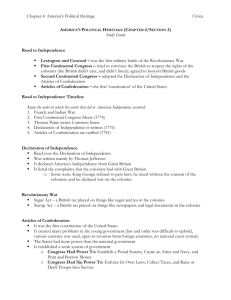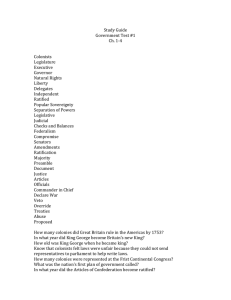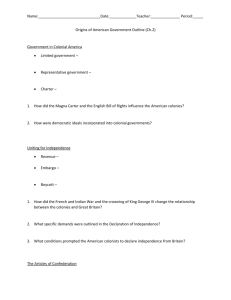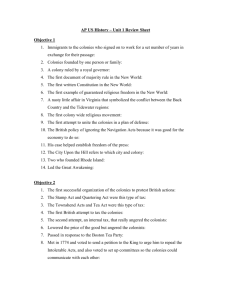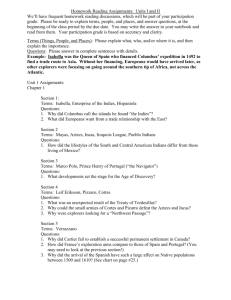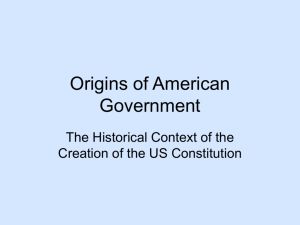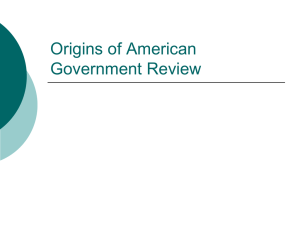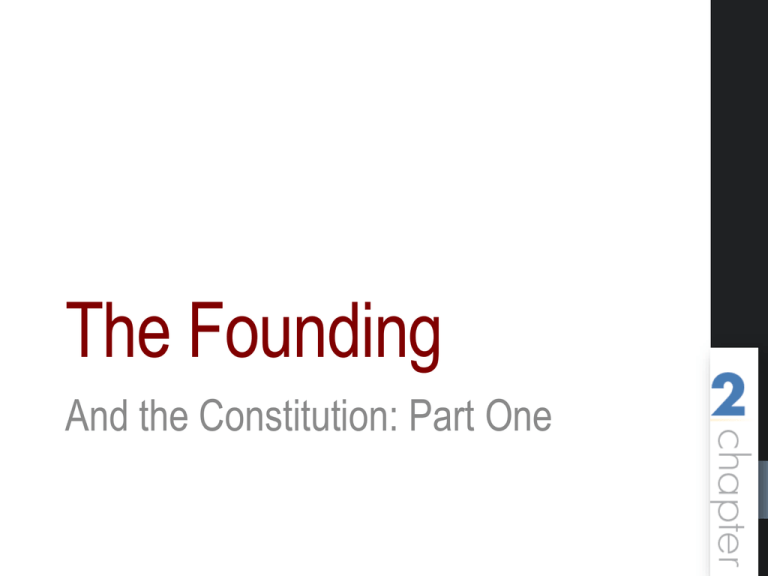
The Founding
And the Constitution: Part One
© 2013 The McGraw-Hill Companies, Inc. All Rights Reserved.
Objectives
• Explain how the American colonies came into being, and
describe the influence of British tradition on the rights
citizens came to expect.
• Describe the factors that led to the American Revolution,
and explain how the basic principles of the revolution
shaped the governments that followed.
• Outline the structure and power of government under the
Articles of Confederation, and describe the weaknesses
that ultimately led to their failure as a form of government.
• Describe the delegates to the Constitutional Convention,
including the issues that united and divided them, and the
compromises among them that led to the final document.
2
© 2013 The McGraw-Hill Companies, Inc. All Rights Reserved.
Objectives
• Identify the four core principles and major provisions of the U.S.
Constitution, as well as the ways in which it was undemocratic.
• Evaluate the arguments of those on both sides of the ratification
battle, and the roles of the Federalist Papers and the Bill of
Rights in helping to secure ratification.
• Describe the formal process of amending the U.S. Constitution
as well as the informal process of amendment through
interpretation.
3
© 2013 The McGraw-Hill Companies, Inc. All Rights Reserved.
The American Colonies
• Road to English settlement did not really begin until 1606:
King James I issued charters to establish American colonies
• Motivations for coming to the colonies:
• Religion
• Economic incentives
• Differences and commonalities among colonists
• Sectional quarrels, but
• Fundamental similarities: English descent, Protestant, mostly farmers,
property ownership common so more opportunity to vote and
participate in politics
4
© 2013 The McGraw-Hill Companies, Inc. All Rights Reserved.
Early Colonial Government & Events in England
• Autonomy from England
• Governors: “paper tigers”
• Elected assemblies held purse
strings
• Magna Carta
• “great charter” in Latin
• 1215 King John: limited powers
• Fundamental basis for the rule of
law
What did this mean for the
colonies?
It meant that when conflict arose with
England in the 1700s, they would find
themselves using these arguments to fight
against both the English parliament and its
King.
• Civil War
• Charles I’s conflict with parliament;
absolute/divine right versus the rights
of the English people; invoked the
Magna Carta
• Commonwealth period after Charles I
beheaded
• James II returned; reasserted divine
right and was run out of the country
• Glorious Revolution 1688
• English Bill of Rights: basic rights of
Englishmen that limited the power of
future kings and queens.
• Together, the Magna Carta and the
English Bill of Rights formed part of
England’s “unwritten” constitution.
5
© 2013 The McGraw-Hill Companies, Inc. All Rights Reserved.
“No Taxation Without Representation”
• Colonists considered the taxes unfair and a violation of
Parliament’s power.
• Colonists had no representatives in Parliament.
• Violation of fundamental principles of the English Bill of Rights.
• Sugar Act (1764): imposed duties on certain foreign goods imported into
the colonies – sugar, coffee, some wines. Also hurt the rum trade.
• Stamp Act (1765): imposed direct tax on printed materials (from legal
documents to newspapers and playing cards)
• Parliament needed money to pay for the French and Indian War (1756-1763);
some of which was fought in North America
• Galvanized the colonies
• Stamp Act Congress – reps from nine of thirteen colonies
• First official meeting of colonial representatives
• Resulted in the Declaration of Rights and Grievances
• Sons of Liberty
6
© 2013 The McGraw-Hill Companies, Inc. All Rights Reserved.
“No Taxation without Representation”
• The British repealed the Stamp Act in February 1766,
BUT…
• Declaratory Act (March 1766)
• Reiterated that the colonies were “subordinate unto, and
dependent upon the imperial crown and Parliament of
Great Britain.”
• Revenue Act (1767) first of the Townshend Acts.
• Indirect tax that placed duties on imported goods from
England.
• Colonists did not respond well to indirect taxes either!
Massachusetts House of Representatives protested.
• England dissolved their legislature and sent British troops
to Boston.
•
Boston Massacre
• Boston Tea Party
• Response to 1773 Tea Act
• Britain responds again with Coercive Acts in 1774 as
punishment; closed the Boston Harbor; took control of
Massachusetts government.
• Had ramifications for all colonies.
• First Continental Congress (1774)
• Agreement reached to engage in boycott of English goods.
• Produced declaration of rights and grievances.
• Claimed the right to a “free and exclusive power of
legislation”
7
© 2013 The McGraw-Hill Companies, Inc. All Rights Reserved.
Revolution and Independence
• Fighting at Lexington and Concord (April
1775)
• Second Continental Congress
convenes in May 1775
• Created the Continental Army; George
Washington to command
• After a year, the Congress moved to
initiate independence and create the first
U.S. Constitution: the Articles of
Confederation
• Why the delay?
• Many colonists had just emigrated from
England; did not want to break
allegiance.
• Thomas Paine: Common Sense (January
1776)
8
© 2013 The McGraw-Hill Companies, Inc. All Rights Reserved.
Revolution and Independence
• May 1776
• Virginia House of Burgesses instructed its delegates to the Second
Continental Congress: propose independence!
• Same month the Congress urged colonies to adopt constitutions
anticipating independence and statehood.
• Committee formed to write the formal Declaration of Independence.
• Who served on this committee? John Adams, Ben Franklin, Thomas
Jefferson, Robert Livingston, and Roger Sherman.
• Jefferson wrote the actual document.
• Greatly informed by Locke’s Two Treatises of Government
• Social contract
• The idea, drawn from the writings of John Locke and others, that government is
accountable to the people and bound to protect the natural rights of its citizens. If
government breaks this contract, the people have the right to rebel and replace the
government with one that will enforce it.
9
© 2013 The McGraw-Hill Companies, Inc. All Rights Reserved.
Revolution and Independence
• Preliminary vote July 1 had two colonies opposing independence:
• South Carolina and Pennsylvania.
• New York abstained as its delegates were unsure of their
instructions.
• Congress delayed the final vote allowing for some strategic
actions by S.C. (reversed vote) and PA delegates (two abstained
allowing a majority to favor independence).
• NY abstained, but would later approve final language.
• July 4, 1776 unanimous declaration in favor of independence from
Great Britain.
10
© 2013 The McGraw-Hill Companies, Inc. All Rights Reserved.
Articles of Confederation
• By the end of 1776 all but three states had written their own constitutions. Georgia,
New York, and Massachusetts would follow in a few more years.
• Colonies were now independent states.
• The Second Continental Congress operated as the national government in the short
run, but slow progress was being made towards the creation of a national
constitution.
• New states had concerns about centralization of authority and struggled with internal
debates about what the best method of representation should be in any national
government body.
• Proportional versus equal representation?
• Where would funding come from?
• What about land west of the colonies? Some boundaries were not yet set for
some states.
• For this reason, drafting of our first constitution, the Articles of Confederation, took
over one year.
• This document created a confederation, or union of independent, sovereign
states.
11
© 2013 The McGraw-Hill Companies, Inc. All Rights Reserved.
Articles of Confederation
Designed to protect state sovereignty
Weak, unicameral legislature
No executive or judicial branch
Only had the powers expressly delegated to it by the states; all other
powers reserved to the states.
• Delegates to the Confederation Congress were appointed by the state
legislature.
•
•
•
•
• Each delegation had a single vote (based on majority of delegates; if no
majority, then it must abstain)
• Passage of legislation required 9 of 13 votes.
• Amendment of the Articles required a unanimous vote.
12
13
© 2013 The McGraw-Hill Companies, Inc. All Rights Reserved.
© 2013 The McGraw-Hill Companies, Inc. All Rights Reserved.
Weaknesses of the Articles
• The authors of the Articles were more concerned with limiting
government power than utilizing its positive aspects.
• The authors’ political views were state-centric, with divergent
economic interests and a view of other states as competitors. These
characteristics would lead to a number of weaknesses in the Articles.
National
Government
had too little
power: no
ability to tax or
regulate
commerce.
No common
currency
No permanent
home
No separation
of powers at
the national
level
No executive
No judiciary
No power to
lead or control:
Shay’s
Rebellion
14


